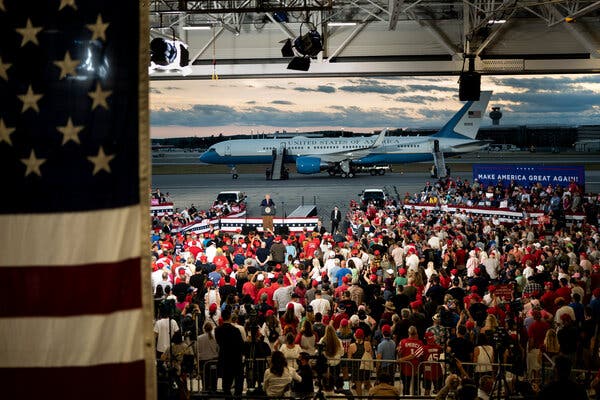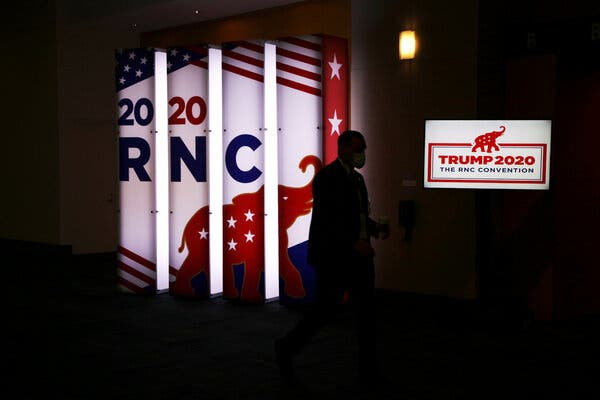Advertisement
As he has done with other aspects of the presidency, Donald J. Trump has redefined the practice in ways that have unsettled even some Republicans.

WASHINGTON — President Trump was proudly litigious before his victory in 2016 and has remained so in the White House. But one big factor has changed: He has drawn on campaign donations as a piggy bank for his legal expenses to a degree far greater than any of his predecessors.
In New York, Mr. Trump dispatched a team of lawyers to seek damages of more than $1 million from a former campaign worker after she claimed she had been the target of sexual discrimination and harassment by another aide. The lawyers have been paid $1.5 million by the Trump campaign for work on the case and others related to the president.
In Washington, Mr. Trump and his campaign affiliates hired lawyers to assist members of his staff and family — including a onetime bodyguard, his oldest son and his son-in-law — as they were pulled into investigations related to Russia and Ukraine. The Republican National Committee has paid at least $2.5 million in legal bills to the firms that did this and other legal work.
In California, Mr. Trump sued to block a law that would have forced him to release his taxes if he wanted to run for re-election. The Trump campaign and the Republican National Committee have paid the law firm handling this case, among others, $1.8 million.
Mr. Trump’s tendency to turn to the courts — and the legal issues that have stemmed from norm-breaking characteristics of his presidency — helps explain how he and his affiliated political entities have spent at least $58.4 million in donations on legal and compliance work since 2015, according to a tally by The New York Times and the nonpartisan Campaign Finance Institute.
By comparison, President Barack Obama and the Democratic National Committee spent $10.7 million on legal and compliance expenses during the equivalent period starting in 2007. President George W. Bush also spent much less, even taking into account his legal spending on the recount fight that went to the Supreme Court, records show.
The spending on behalf of Mr. Trump covers not only legal work that would be relatively routine for any president or candidate and some of the costs related to the Russia inquiry and his impeachment, but also cases in which he has a personal stake, including attempts to enforce nondisclosure agreements and protect his business interests.
Many of the bills being paid by donors to Mr. Trump and his party have come from the Republican National Committee’s “recount account.” It is a special fund created after 2014 when Congress — at the request of campaign finance lawyers and leaders of both parties — allowed much larger contributions by individuals to the political parties, totaling $106,500 per person, compared with the normal $2,800 limit.
It is impossible to know based on Federal Election Commission filings how much of the $58.4 million in total legal bills went to routine legal work. Payments from the political committees to lawyers and law firms are not itemized by case, so the filings do not break down how much donor money went to pay for specific legal actions. A spokesman for the Trump family would not say how much Mr. Trump had paid out of his own pocket or his company’s in legal fights, including Mr. Trump’s attempt to block access to his personal financial records.
It is also hard to differentiate between legal clashes the president has initiated and those in which he is the target of opponents. And a growing portion of the overall legal spending has come recently as his campaign has stepped up its efforts to battle Democratic actions to make voting easier.
But an examination of spending by his various campaign arms documents how the intermingling of his presidency, business interests, campaigns, defense against the Russia investigation, impeachment and eagerness to penalize rivals have led to millions of dollars in donor money going to help bankroll litigation.
Drawing on donations to pay many legal expenses is permitted by campaign finance law. But as he has done with other aspects of the presidency, Mr. Trump has redefined the practice in ways that have unsettled even some Republicans, who point in particular to examples like his efforts to enforce nondisclosure agreements with former staff members.

“Vindicating President Trump’s personal interests is now so intertwined with the interests of the Republican Party they are one and the same — and that includes the legal fights the party is paying for now,” said Matthew T. Sanderson, who has served as a campaign finance lawyer to presidential candidates including Rand Paul, Rick Perry and John McCain.
A spokesman for Mr. Trump declined to comment. But a spokeswoman for the Republican National Committee said it was Democrats and other liberals who were driving this blitz of spending.
“The R.N.C. is more than happy to cover the costs of defending the president from the Democrats’ baseless litigation and partisan impeachment sham,” said the spokeswoman, Mandi Merritt.
The filings do not address the value of work for which he has not been charged, like Rudolph W. Giuliani’s unpaid position as his personal lawyer. Nor do they account for the legal support Mr. Trump, as president, receives from the Justice Department, which has helped defend him on issues that blur the line between his public and private roles, like the constitutional prohibition on a president receiving benefits from other governments and efforts to obtain his tax returns and financial records.
The advent of the special recount account for legal expenses has fueled an explosion of available cash for both political parties. But because the Federal Election Commission has given little guidance over how money put into this account can be spent, the political parties have used them on a variety of seemingly unrelated purposes, including charter airplane flights, records show.
Perkins Coie, a prominent firm that handles Democratic candidates, has been paid $17 million just by the Democratic National Committee in the last four years, benefiting as well from this new flow of large donations to the party.
In Mr. Trump’s case, the reliance on high-dollar donations had led to questions about whether contributors from casinos, Wall Street, coal and other industries expect something in return.
Republican donors who have sent large amounts of money since 2019 to this special R.N.C. legal account include Joseph Craft, who is the chief executive of a coal mining company that has benefited from Mr. Trump’s regulatory actions. They also include Stephen A. Schwarzman, the chief executive of the Blackstone Group, and Thomas J. Barrack Jr., both private equity investors who have long been close to the president, and members of the Fertitta family of Las Vegas, who own a casino there.
Ms. Merritt, the Republican committee spokeswoman, rejected any suggestion that the donations were made to try to influence Mr. Trump.
“That is an absurd and unfounded allegation,” she said. “Our donors are highly motivated by Democrats’ radical attempts to try and take away the voice of the American people by gaming the election through the courts, and fully support our fight to uphold election integrity, fight back against impeachment, and challenge Democrats’ attacks on the president.”
All presidents are enmeshed in litigation related to their official duties, and Mr. Trump’s 2020 campaign and the Republican National Committee are fighting an array of topics related to the election, including litigation about mail-in ballots and voting rights.
But for Mr. Trump, who has always preferred to use other people’s money in his business ventures, the reliance on campaign funds as a legal kitty extends to issues that are of concern to him personally.
The biggest payments have gone to the Jones Day law firm, which has received a total of $18.8 million from Mr. Trump’s campaign, the Republican National Committee and America First Action, a super PAC closely affiliated with Mr. Trump. Most of that spending — $11.5 million — came from Mr. Trump’s campaign, reflecting the firm’s heavy load of campaign-related work as well as cases more personally tied to Mr. Trump.
Among the 20 suits Jones Day has been involved in include one filed by demonstrators who claimed they were beaten at a Kentucky political rally, a filing in federal court claiming that Mr. Trump and his allies helped distribute information obtained by Russian hackers during the 2016 election and one from a Missouri man who claimed he was arrested after he simply laughed while at a Trump rally. A spokesman for the firm declined to comment.
Smaller amounts have gone to boutique law firms, such as Daniel K. Hagood, a Texas lawyer whose website says he specializes in “representing companies and individual entangled in the criminal justice system.” He has been paid $254,331 this year by America First Action, a super PAC associated with Mr. Trump. Neither Mr. Hagood nor America First Action would answer questions about the work he was doing.
Campaign funds also were used to fight a lawsuit filed by an aide to Mr. Trump’s 2016 presidential campaign who claimed that Mr. Trump had inappropriately kissed her, with $196,229 paid to a Florida firm, Ford & Harrison, and to a Los Angeles-based lawyer, Charles J. Harder, who has been paid a total of $3.4 million. (Mr. Trump prevailed in this case.)
One major area of spending, records show, has been an attempt to enforce nondisclosure or nondisparagement agreements with former aides who have accused Mr. Trump or members of his staff of wrongdoing.
Mr. Harder, who is frequently hired by Mr. Trump’s campaign, is perhaps best known for his work on behalf of the professional wrestler Hulk Hogan in a lawsuit filed in 2012 against the website Gawker, which ended up causing its bankruptcy.
Another key lawyer in this effort is Lawrence S. Rosen, who works out of Mr. Trump’s 40 Wall Street office building in Manhattan and has handled real estate legal disputes and other issues for Mr. Trump for decades. Bills from Mr. Rosen’s firm to the Trump campaign total $1.5 million.
Together, they have taken up more than a dozen cases for Mr. Trump, many of which have a particularly personal flavor.
They include legal actions involving Jessica Denson, a Los Angeles-based actress who took a job at Trump Tower in New York as a supervisor of the campaign’s national phone bank; Omarosa Manigault Newman, a former guest on “The Apprentice” reality show who later became a campaign aide, and Clifton Sims, a former White House communications aide. Each of them spoke publicly in a way that Mr. Trump considered critical of him or his campaign. In each case, the president asserted that they had violated nondisclosure agreements.
Mr. Rosen also represented the campaign in a lawsuit that involved a 2016 campaign aide who became pregnant during an affair with her boss, Jason Miller, and was then dismissed after Mr. Miller reportedly told her she could not be seen “waddling around the White House pregnant,” the lawsuit says.
Mr. Harder also worked on lawsuits on behalf of Mr. Trump’s campaign against news organizations including The Washington Post, The New York Times and CNN, claiming they published “false and defamatory statements” about the president in opinion pieces.
Lawyers defending the former Trump aides said the use of campaign funds to bankroll Mr. Trump’s legal efforts is part of a long-running strategy to intimidate and silence his critics.
“It is the weaponization of lawsuits that are frivolous.” said John Phillips, a Florida lawyer representing Ms. Manigault Newman. “And they are intended to suppress First Amendment speech. No other president in this history of the United States has ever resorted to anything like this.”
Defending himself against lawsuits by individuals who claim they were assaulted at campaign events has also consumed a significant chunk of campaign funds. Those include long-running lawsuits filed by a Massachusetts peace activist, Rod Webber, who sued Mr. Trump’s campaign after he claimed he was thrown “head first into a table” after he had tried to ask a question of Mr. Trump in 2015 during an event in New Hampshire. The Trump campaign has paid $101,828 to a New Hampshire-based firm, Cleveland, Water and Bass, that has been handling the case since last year.
Others include the lawsuit Mr. Trump and his campaign jointly filed in California last summer in a successful effort to overturn the state’s requirement that he release his income tax return if he wanted to be on the presidential ballot in California.
The investigations of Mr. Trump by the special counsel and congressional Democrats have also generated large legal tabs that have been picked up in part by the president’s political operation. That includes paying for lawyers to help represent members of his family who were targeted in lawsuits or were called to testify, including Donald Trump Jr., and Jared Kushner.
Campaign donations have gone to pay legal bills for Hope Hicks, a White House adviser; Keith Schiller, the former bodyguard for Mr. Trump; Boris Epshteyn, a former Sinclair Broadcast Group commentator who now serves as a Trump campaign adviser and Corey R. Lewandowski, Mr. Trump’s former campaign manager.
The case of Michael D. Cohen, Mr. Trump’s former personal lawyer, showed the limits to the president’s willingness to foot legal bills. When Mr. Cohen was pulled into the investigation of Mr. Trump’s ties to Russia, the Trump campaign covered a large share of his legal tab.
But after federal investigators raided Mr. Cohen’s office, questions began to emerge about whether Mr. Cohen might turn on the president.
“Most people will flip if the Government lets them out of trouble, even if it means lying or making up stories,” Mr. Trump said on Twitter on April 21, four days after his campaign paid $48,342 to Mr. Cohen’s lawyer, a small share of the remaining amount owed. “Sorry, I don’t see Michael doing that despite the horrible Witch Hunt and the dishonest media!”
But soon enough, Mr. Cohen did flip. The campaign then halted payments to his lawyer.
The impeachment effort produced substantial spending by Mr. Trump’s political entities. Mr. Trump’s campaign and the Republican National Committee, which has been raising and spending money in coordination with Mr. Trump, have helped pay the legal bills from the firms of Jay Sekulow, Marc E. Kasowitz, Jane Raskin and Alan Dershowitz.
It is not known how much they charged, or whether all the payments to them stem from their work on impeachment. But Trump-affiliated campaign entities have paid these lawyers and their firms $2 million since 2018, Federal Election Commission records show.
There is no record of payments to Mr. Giuliani, the former New York mayor, who has been providing legal services free of charge to Mr. Trump since 2018. In his financial disclosure report filed in July, Mr. Trump said the value of the work done by Mr. Giuliani “is unascertainable.”
Mr. Trump has sometimes used lawyers who also have intervened with the federal government on behalf of other clients, including appeals made directly to him.
Mr. Sekulow, for example, has run a nonprofit group that pressed the government to stop abortion funding and has also urged the Trump administration to exempt churches from certain federal policies, such as hiring rules. Mr. Sekulow said the dual roles did not represent a conflict because his work for Mr. Trump was done through a separate law firm.
Mr. Giuliani also has a collection of clients whose agenda he has pushed including a Venezuelan businessman under criminal investigation in the United States.
William S. Consovoy, a lawyer who has done extensive work for Mr. Trump paid with campaign funds, including challenging the California law that tried to force Mr. Trump to release his tax return before he could run for re-election, is also suing the Justice Department on behalf of corporate clients such as U-Haul International. Mr. Consovoy and Mr. Giuliani did not respond to requests for comment.
The role of the Justice Department in litigation involving Mr. Trump has also drawn attention.
The department automatically represents the president of the United States when he is sued. But during Mr. Trump’s tenure, it has supported Mr. Trump’s legal team in lawsuits filed on behalf of Mr. Trump against other parties, litigation that is intended to protect Mr. Trump’s personal financial interests.
The Justice Department said it was obligated to protect the independence of the office of the president, noting in one legal filing that Mr. Trump, as president, “occupies a unique position in the constitutional scheme” and that he should be exempt from subpoenas seeking his personal financial information.
At least 10 department lawyers were named on legal briefs filed as Mr. Trump has tried to block institutions including Deutsche Bank from releasing his financial records. Another 10 department lawyers were listed on filings made in lawsuits as Mr. Trump had violated the Constitution’s emoluments clause by taking money from foreign governments at his hotels and clubs.
Justice Department lawyers have also been involved in cases in which the president sought to restrain former aides who had written books about him, including one by John R. Bolton, the former national security adviser.
Robert Weissman, the president of Public Citizen, a nonprofit group that has tracked ethical issues during the Trump administration, said the use of campaign and federal government funds to finance legal actions captured a dizzying array of themes his group has sought to highlight.
The legal work, he said, is being used to defend violence at political rallies, chill the free speech of former aides and fight allegations of unethical actions by Mr. Trump himself. And it is being paid for in part by large individual donors who could seek help from Mr. Trump in dealing with government actions that affect their own interests at a time when the Justice Department has moved from simply defending the president to helping protect his personal finances, he said.
“It is an astounding nexus of corruption,” Mr. Weissman said. “And the legal system in the United States is the one that is supposed to be defending justice.”
Kitty Bennett contributed research.
Updated Sept. 4, 2020
-
The Latest
-
How to Win 270
-
Voting by Mail
-
Will you have enough time to vote by mail in your state? Yes, but it’s risky to procrastinate. Check your state’s deadline.
-
-
Keep Up With Our Coverage





